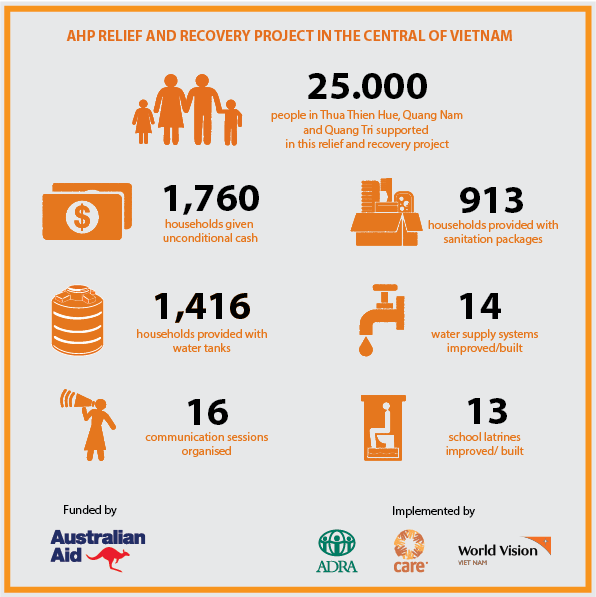In October 2020, four typhoons made landfall on Central Vietnam, causing floods, landslides, storm surge and strong winds that affected millions of people. This response will be a coordinated action led by World Vision Australia in partnership with CAN DO (ADRA Vietnam), and CARE Australia to provide relief and early recovery assistance to affected communities in the three most severely affected provinces. In collaboration with provincial and district-level governments, the consortium will improve access to safe water, promote hygiene and sanitation, ensure protection for relief workers and beneficiaries, and facilitate livelihood recovery through the distribution of livelihood materials and cash/voucher-based assistance.
Overall Objective
The funding will support the immediate needs of 6,800 families (25,063 people, 50% women) affected by the four consecutive typhoons (Linfa, Nangka, Saudel, and Molave) and floods, landslides, and whirlwinds, through improved access to water supply, sanitation, and hygiene and livelihood support in Thua Thien Hue, Quang Nam and Quang Tri provinces. It will also include protection support for target beneficiaries and relief workers.
Overall Strategy / Approach
The Joint Rapid Need Assessment (21-23 October) led by three UN and Government of Vietnam’s Joint Assessment Teams (JATs), in collaboration with WV and CARE, indicated critical needs in WASH, protection, and livelihoods in Nam Giang and Nam Tra My District in Quang Nam Province, Huong Thuy and Phu Loc Districts in Thua Thien Hue Province, and Hai Lang in Quang Tri Province. Accordingly, the proposed action targets these three key sectors in each province with each agency drawing on its relative strengths.
WASH: Assessments have identified a critical lack of safe water and inclusive hygiene and sanitation in target areas. Water pipes were severely damaged and domestic water facilities swept away or buried. Affected populations, particularly women and girls, cannot maintain adequate hygiene (no water for washing, no sanitary materials for menstrual hygiene). WASH interventions will focus on improving damaged water facilities and small-scale water infrastructure such as water pipes, cement water tanks, provision of water containers and water treatment chemicals to ensure immediate access to water. Damaged latrines at affected schools and health stations will be repaired or rebuilt to enable sanitation and ensure accessibility for people with disability. Supported households will also be trained on protection of water facilities and water supply schemes from storms and floods. To address inadequate hygiene, the project will conduct behaviour change communications on WASH to raise awareness of water-borne disease in the flood zone, flood water treatment methods, handwashing, and Covid-19 prevention measures. Gender-sensitive protection kits will be provided to affected households and will include items such as; face cloths, tooth brush, tooth paste, soaps, underwear and sanitary pads.
PROTECTION: Assessments indicate that during the floods, evacuation sites were often public places (community houses or common People’s Committee offices) or neighbour’s houses. These locations do not have sleeping areas or bathrooms/toilets separated by gender. Overcrowded spaces with both family and non-relatives limits privacy and can lead to conflicts between families, general harassment and intimidation, increased risk of violence, sexual harassment of women and girls and boys. Protection and safety issues also arise when the power is cut, and communication lines are disrupted, which results in isolation. Through protection interventions, the consortium will increase protection for beneficiaries and relief workers through improving their access to protection support and accountability mechanisms. This includes training for project staff, local governments, and local communities about protection issues in emergencies and protection measures. Project staff and collaborators will also be equipped with live-saving, Covid-19 Personal Protective Equipment (PPE) kits, and beneficiaries will be requested to practice Covid-19 prevention measures at distribution points. Feedback channels will be facilitated by posters, banners, feedback forms, complaint boxes, and active hotlines.
LIVELIHOODS AND FOOD SECURITY: Assessments highlight that people in Thua Thien Hue, Quang Tri, and Quang Nam experienced severe damage to crops and loss of livestock which will not be recovered quickly without assistance. Based on observations from previous relief responses and the ongoing response to the floods and typhoons in Vietnam where in-kind assistance has not always met the specific needs of affected populations, the consortium will implement livelihood interventions including cash/voucher transfer in addition to providing in-kind support. For in-kind assistance, the project will provide food and complementary food aid, and livelihood materials for affected households, particularly those with small children, the elderly, and pregnant and lactating women.
To meet the diverse needs of the most vulnerable flood affected communities and to protect their dignity, multipurpose cash transfer will be conducted through engagement with Financial Service Providers such as VNPost and Viettel who could reach the hard-to-reach areas in the target districts. A rapid market assessment will be conducted to decide on delivery modalities of Livelihood interventions. The market assessment findings will help in selecting the delivery modality of the Livelihood input support. WVI Vietnam will also do periodic market assessment and price monitoring to ensure ‘Do No Harm’ principle and avoid any negative consequence on either market or on community. WVI Vietnam is an active member of National Cash Working Group, hence will be used the coordination platform to advocate the unmet needs of the MPCA beneficiaries those are beyond the scope of the project to address. WVI Vietnam will connect the MPCA beneficiaries with larger social protection programme of Govt / UN or other bilateral stakeholders. As an exit strategy, WVI Vietnam will organize those MPCA beneficiaries in S4T / savings groups to ensure their financial sustainability.






